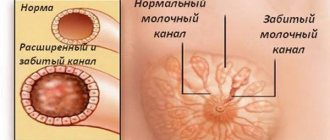How do you know when to start weaning your baby? In fact, the process of weaning from breastfeeding physiologically begins at about 6 months, when the mother introduces complementary foods into the baby’s diet, and he stops feeding exclusively on breast milk. In the normal course of breastfeeding, weaning occurs slowly and gradually without any conscious effort or action.
In various world cultures, where society does not put pressure on the mother to give up breastfeeding as quickly as possible (the need to work or study, the social undesirability of long-term breastfeeding), children stop drinking mother's milk between the ages of 2.5 and 7 years. The World Health Organization recommends breastfeeding for up to 2 years or longer.
How does natural weaning occur?
The process should proceed naturally, without coercion from the child or any effort on the part of the parents. Everything should go as usual, without fuss and haste. For the first 6 months of life, the baby should be exclusively breastfed, during which he does not receive additional water or any other food. After the child reaches the age of 6 months, the mother, while continuing to breastfeed, adds complementary foods to the diet. This is the first step towards natural weaning. After the baby's first birthday, you can continue to breastfeed as long as it is convenient for the mother and as long as the baby takes the breast. Breastfeeding is beneficial for mother and baby at any age, and there is no evidence that prolonged breastfeeding negatively affects a child's character.
Long-term breastfeeding will be especially beneficial for the baby in the following cases:
- The child is teething or is sick. During these periods, breastfeeding will give the child strength and creates a feeling of psychological comfort and security. In addition, antibodies in breast milk will help the baby fight off infectious agents.
- There are changes in the family, additions - any situation that can cause stress in the baby.
- If the child resists all attempts to wean him from the breast. If mom can continue breastfeeding, it may be worth delaying the weaning attempt for another month or two.
If you stop breastfeeding because of medication or surgery, be sure to get at least one other doctor's opinion. In most cases, you can continue breastfeeding after surgery, and many medications have analogues that are acceptable while breastfeeding.
At what age should you wean?
WHO (World Health Organization) recommends starting complementary feeding after six months, but not stopping breastfeeding until two years of age. That is, the introduction of complementary foods does not mean that the mother should stop breastfeeding her baby. No specialist will give clear recommendations at what age it is best to do this. In this matter, first of all, you need to focus on the child himself, his physical and psychological readiness to give up breastfeeding. There are a variety of points of view of doctors and psychologists, all of them are substantiated, tested and confirmed. But there is no consensus yet.
Definitely, the deadline is two and a half years. By this age, the baby's sucking reflex fades away, and he is no longer psychologically connected to his mother.
There is an opinion that after a year, mother’s milk no longer contains substances useful for the child, therefore the optimal age for weaning is a year and a half.
Photo source: Photo by Dave Clubb on Unsplash
There is also the opposite opinion that throughout the entire period of breastfeeding, mother’s milk contains substances beneficial to the baby and that only breast milk can compensate for all the deficiencies of necessary elements in the body of a growing baby.
Therefore, most weaning guidelines recommend looking at the psychological, emotional and physical readiness of both baby and mother.
Too early and forced weaning can lead to undesirable consequences:
- loss of psychological contact with the mother can lead to the appearance of neuroses and fears; the child needs more physical contact with her (constantly asks to be held or sleeps only with the mother, for example);
- problems with sleep – falling asleep is delayed, the number of night awakenings increases;
- with early (up to a year) weaning, the child’s body’s resistance to viruses and infections decreases;
- in some cases, bad habits may appear due to stress - the child may start sucking his finger, biting his nails, constantly chewing something, etc.;
- may cause food allergies.
Weaning too late can also cause negative consequences:
- The child will have difficulty chewing solid foods and may reject thick foods;
- problems developing chewing and biting skills;
- There may be a deficiency of nutrients necessary for the child’s development.
How do you know when your baby is ready to wean?
Babies are rarely weaned suddenly and without warning. Typically, the weaning process is slow and gradual, even for babies who are weaned earlier than usual due to separation from the mother and the use of pacifiers and bottles. If a child suddenly rejects the breast, then this is most likely a refusal of the breast due to negative body conditions, uncomfortable feeding positions or stress.
There are a number of signs by which you can determine that your baby will soon be ready to wean.
The baby takes the breast less and less often. As children grow older, they will play more, explore the world around them, walk, talk, eat a variety of foods, and breastfeed less and less. Finally, the baby will breastfeed once a day, eventually once every few days or several times a month.
The baby loses interest in breast milk. Babies under one year old may lose interest in breastfeeding if they replace the pleasure of suckling with sucking on a pacifier or their own fingers. These babies will soon be ready to wean, but their emotional needs for suckling will remain for some time (sometimes for many years).
What not to do
In order for weaning from night feedings to be successful, you must clearly follow the intended goal and not deviate from the path.
Common mistakes:
- Give up halfway through. If the mother has not fed the baby in the first half of the night for several days, but suddenly gives in and gives him the breast, then the baby will quickly realize that hysteria can achieve what he wants.
- Smear your chest with brilliant green, mustard or something else. These techniques can affect a 2-3 year old child, but for a 6-12 month old baby they are harmful and cruel.
- Tighten your chest. You can hear a lot of advice from grandmothers about winding down breastfeeding. To prevent the milk from burning, they recommend pulling the breasts tightly. But by these actions the mother injures the mammary glands and in the future may become a regular patient of the mammologist.
- Remove night feedings at inappropriate times. You should not wean during illness, during teething, before traveling or traveling, or if there is an unfavorable emotional situation in the family.
- Give the child to a grandmother or other family member. The baby should feel that his mother loves him and is not leaving him anywhere. If you take away the breast and the mother leaves with it, then it will be a real disaster for the child.
Stopping breastfeeding
If the baby is weaned before the age of 1 year, the mother may need to express and feed the milk for a while longer, gradually reducing the number of expressions to stop lactation. Until the age of one year, the child will have to be fed with formula milk. If the baby is over a year old, you can wean the baby over a few weeks by reducing one feeding to a few days. It is better to start reducing breastfeeding in the daytime. Feeding sessions after waking up or before bedtime should be reduced last. Avoid placing your baby in high chairs—feed in your arms or in a sling so that the baby can enjoy physical closeness with the mother. During the time previously reserved for breastfeeding, take your baby to play or go for a walk, in a stroller, or in the car. Car rides usually lull babies to sleep very well. During weaning, your baby needs to pay more attention and physically express love more often through touching, hugging and kissing. Talk to your child about weaning. Even small children can understand what you are saying and accept your opinion.
Lifehacks from moms
If the mother decides that it’s time for the baby to do without breastfeeding at night, then the experience of other women will help her.
Lifehacks from moms:
- If you decide to stop breastfeeding completely, then you need to make up for the lack of physical and emotional contact. During the day, you should spend more time with your baby, playing with him, hugging him and picking him up. It is important that the child understands that his mother loves him. During weaning, the baby should not feel abandoned.
- When the baby begins to whine without waking up, do not immediately put the breast in. You can just pat him on the back and rock him a little in your arms. If the baby is not hungry, he will feel his mother and immediately fall asleep. Often women at the weaning stage deceive the child with a pacifier.
- In order not to feed at night, the baby must not be hungry. It is advisable to feed your baby tightly half an hour before bedtime. If porridge is already present in the baby’s diet, then it will become a hearty, nutritious dinner.
- A ritual will help you wean yourself off breastfeeding. Regular children tolerate weaning better. They know exactly what will happen to them in the next minute and feel calm. Each mother chooses her own sequence of actions in the ritual, for example, bathing, dinner, changing clothes, reading a book, breastfeeding and sleep.
- In order for your baby to sleep better at night and not wake up to nurse, you need to give him a good walk. The night before, active games and a long walk are encouraged. Closer to bedtime, it is recommended to bathe in a warm bath, perhaps with the addition of children's relaxing foam. The more tired your baby is, the better his night's sleep will be. It is important not to “overexpose” the child, so as not to get the opposite effect.
Each mother determines the timing of weaning from breastfeeding independently. The participation of third parties in this matter is unacceptable. You shouldn’t listen to your neighbor who says that breastfeeding at night after 6 months causes caries. There is no need to blindly believe that feeding at night up to 3 years of age contributes to the formation of high intelligence. There must be moderation in everything. And only the mother knows what will be better for her child - stop night feedings at six months or maintain them after 12 months.
Stopping breastfeeding
Even with slow and gradual weaning, lactation can continue for some time and cause quite a bit of discomfort. If necessary, you can relieve tension in the chest by expressing a small amount of milk. Do not tighten your breasts - this can lead to blockage of the milk ducts and a breast infection. It is enough to wear a tight fitting bra. You can reduce chest pain by taking ibuprofen. You can also use cold cabbage leaves placed in your bra cups. Tea with sage, which contains natural estrogen, which reduces milk production, will help reduce lactation. Other herbs such as peppermint, parsley, yarrow and jasmine may also help reduce milk supply. Always consult your doctor before using any medications or herbal remedies.
Should I worry if my pacifier has become indispensable?
First off: what's the difference?
It's actually simple. A nipple is a product that is shaped like a female nipple and is placed on a bottle. That is, there is a hole in the nipple, and it is intended for feeding the baby. A pacifier is also a product that resembles a nipple, but there is no hole in it, and you cannot feed your baby through it. A child can only suck a pacifier and a pacifier, nothing else. Therefore, I will consider them together.
Now about the myths. There are quite a lot of them on the Internet and I will explain the most common ones about nipples (pacifiers).
The pacifier “spoils” the bite.
True, with one “but”.
A pacifier is one of the reasons for the formation of primary malocclusion pathologies in children if:
- the child is over 1 year old (all primary incisors have erupted, and by 3 years all primary teeth have erupted)
- use of the pacifier is unlimited (24 hours a day)
- with prolonged use of a pacifier, almost 80% of children develop an abnormal primary bite (the primary teeth of the upper jaw move forward)
- weaning from her was quick
For example, if not properly weaned from a pacifier, a child may start thumb sucking. And this is already a bad habit.
According to one study, in children who already have primary malocclusion pathology, with proper and timely weaning from the pacifier, the dental system can recover on its own (65-83%). In addition, the presence of such a bite of primary teeth does not mean that the permanent bite is not formed correctly.
A small conclusion: if you use the pacifier correctly, following the recommendations of doctors, indications and contraindications, you can avoid harmful consequences.
The pacifier calms the baby.
Of course it's true.
The pacifier helps satisfy the sucking reflex, the baby calms down and falls asleep, and sleeps more peacefully at night with it. And mommy can absolutely use this. Of course, you can use it less often during the day.
The pacifier disrupts breastfeeding, problems arise, and a pacifier should not be used at all during breastfeeding.
True in some situations.
Sucking a mother's breast is a serious job for a child: you need to latch onto the breast correctly (the pacifier has a smaller latching area), actively suck on the breast to get enough milk (it is easier to suck on the pacifier, since the hole/s in it are larger and the milk flows faster).
Indeed, when there is not enough milk, the baby is supplemented with formula, then you need to choose the right pacifier (and continue to apply it to the breast in order to normalize lactation), since the child will not want to strain and will suck the breast sluggishly, will receive less milk, and therefore will worry more often. The baby may also bite and cracks may appear on the nipples. In this case, it is recommended not to give a pacifier to a healthy child unless indicated until breastfeeding is established (this is up to 1 month).
The pacifier can be used, but according to indications and for a limited time. Therefore, in the maternity hospital, the mother should consult with a doctor: is a pacifier necessary, how to maintain lactation, how correctly the child should latch onto the breast, what feeding technique and care for the mammary glands.
The risk of developing acute otitis media increases when using pacifiers.
This opinion is based on one study conducted in Finland with children aged 7-18 months, which found that the risk of developing acute otitis media (middle ear infection) was 29% lower in children who did not suck a pacifier. According to some experts, this depends on changes in pressure in the ears and leads to the accumulation of fluid inside the middle ear, the infection of which leads to the development of the disease.
I have a counter question: how long should a child suck a pacifier per day for a pressure shift to occur? To this I can only say one thing: you need to use the pacifier correctly.
A pacifier in the mouth is a source of infection.
Is it true.
It's a matter of hygiene:
- wash the pacifier once a day with baby soap or a special care product
- be sure to sterilize by boiling or in a bottle sterilizer before first use and in subsequent use
- use a container to store it
- If the pacifier falls on the floor, do not lick it! Rinse under running water or rinse with boiling water
- monitor the condition of the pacifier surface (presence of damage). If there is even one small scratch, change the pacifier. Uneven surfaces serve as a breeding ground for germs
A pacifier “slows down” a child’s development.
The sucking reflex is an important stage in the development of a child and, accordingly, it is temporary. In children under one year of age (after the reflex physiologically fades away), problems may arise if the sucking reflex is dissatisfied. But every mother should understand that the breast is the best option for the child, so a pacifier is a backup option.
Also, babies grow up to be more sociable and sociable (unless prolonged pacifier sucking has led to malocclusion and speech impairment).
It is difficult to wean a child off a pacifier, as it is addictive.
Is it true.
A child's sucking reflex is pronounced from birth and only by the age of 3 it fades away completely. At this time, it is important to gradually and with minimal stress for the child wean him off the pacifier, as this can then become a habit.
Some doctors believe that it is easiest to wean a child at the age of 1-1.5 years and does not need to be delayed until 3-4 years. The following is a list of when it is necessary to wean a child off a pacifier:
- child's age 3 years
- the child sucks a pacifier for a long time during the day with breaks for food
- the child does not want to communicate with peers and play interactive games
- The doctor discovered a speech delay in the child
As for the weaning process itself, there are also several rules:
- you need to start during a period of complete health, and in the absence of other stressful situations (kindergarten, potty training, sleeping separately, moving, etc.)
- There is no need to smear the pacifier with something tasteless, spicy or sour - the child can get this product into his eyes and nose, which can lead to an allergic reaction and other undesirable consequences
- Gradually cutting off the rubber part of the pacifier is also not an option, since the child may bite off a piece of it
What should you do then? There are many different methods on the Internet, but they are all divided into quick and gradual methods.
The quick method is tougher, but also the most reliable: at one point the mother simply hides it and doesn’t show it again, doesn’t remind her of the pacifier. This method is difficult, because not only the child sheds tears and throws hysterics, but the parents also suffer while looking at it. Also, parents need to stand firmly on their own and not make concessions to the child.
The gradual method is more loyal and calm. The point is to distract the child as often as possible, keep him busy with activities and games without the presence of a pacifier nearby, leading to the point that the child completely refuses or forgets about it.
When a child needs a pacifier only before falling asleep, you need to choose another way to put the child to sleep: read fairy tales, conduct a dialogue with the child.
Another method is to give it to another small child (baby). Not all, but many children are ready to part with their pacifier for the benefit of another child.
A child's love for a pacifier can develop into bad habits.
Smoking. Some psychologists argue that smoking is a consequence of an unsatisfied sucking reflex. That is, it’s the other way around - insufficient use of a pacifier led to smoking. Or another bad habit - biting your nails.
The habit of biting nails occurs in people who do not tolerate stress, tension and anxiety well. This is their way to calm down and it has nothing to do with the pacifier.
Be healthy!
Sincerely, Oksana Olegovna.
Call a breastfeeding specialist to your home
At the Group’s children’s medical centers, we know that the most convenient place for breastfeeding consultations is your own cozy home:
- A specialist will come to you at a convenient time. You don't have to go to the clinic and wait in line. Consultations can also be held directly in the maternity hospital (if visits are permissible) or in a medical center.
- A familiar home environment makes consultation easier for both mother and child.
- At home, the consultant will be able to devote more time to both the child and the parents.
- The consultant is always a phone call away: day and night (at night you can call the contact center or write to the consultant, the consultant will answer as soon as possible), on weekdays and on weekends.
- Support from a specialist is not one-time consultations, but accompaniment: the consultant will visit the mother and baby again, if necessary, after 2-4 weeks to check how feeding is going and the baby’s weight gain.
In addition to calling a breastfeeding specialist to your home, you can call doctors of the main specialties: pediatrician, surgeon, allergist, urologist, pulmonologist, hematologist, dermatologist, ophthalmologist, ENT doctor, orthopedist, gastroenterologist and osteopath. You can also take tests, perform physiotherapy and massage at home. Infant swimming consultants can advise you at home and conduct a master class.
Find out about the special offer “Comprehensive examination at home”: the convenience of this program is that you can choose from a list of pediatric doctors exactly those specialists that your child needs and an individual set of medical services with a 20% discount!
Is it worth weaning off?
It is impossible to accurately determine the age when it is necessary to wean a child from the breast. It is not controversial that breastfeeding
- Up to six months is considered mandatory
Mother's milk helps the newborn adapt to the world around him, provides protective substances against many diseases while the baby's immune system is not yet formed, and is the best nutrition.
- Up to one year – desirable
The baby’s immunity is still weak, complementary foods are just beginning to be introduced, and mother’s milk is better than any formula in terms of nutritional qualities and adaptation by the baby’s body.
- After a year, everything depends on the individual characteristics of the relationship between mother and child
However, we cannot still exclude the usefulness of mother’s milk for the child, and especially the psychological connection between baby and mother.
There are times when a child switches to regular food and easily gives up breastfeeding. But in most cases, the baby becomes so attached to his mother’s breast that it is very difficult to wean him off.
If a woman does not experience any difficulties associated with breastfeeding, she enjoys such closeness with the child, then there is no need to rush to wean the child from the breast.
There is no need to listen to the advice of friends, parents and other people; the mother must make a decision based on her feelings. It is only worth noting that psychologists do not approve of feeding after three years.
If a woman experiences difficulty breastfeeding, does not get enough sleep at night, has pain during feeding, and often needs to go away for a long time, then you can gradually stop feeding, especially when the child is over a year old.
Advantages of calling Virilis Group specialists to your home
- Travel to any area of the city and region without restrictions.
- No insurance, registration or citizenship is required to receive medical care.
- Providing assistance to children of any age.
- Experience in responsible treatment of children in St. Petersburg since 1991.
- 6 own children's medical centers with 650 specialists in 49 specialties.
- Possibility of diagnostics and continuation of treatment in our clinics.
- Coordination with other doctors of the VIRILIS Group of Companies clinics: we are a single team, and not individual doctors from a “mobile” clinic.
- 24/7 contact center.
- Issuance of official medical certificates and documents.
- Possibility of purchasing a package of a comprehensive medical program for a child, including the “Emergency Care” and “Comprehensive Examination at Home” packages.
- Special medical programs for newborns and infants.
When not to interrupt breastfeeding
There are periods and circumstances in a child’s life when it is better not to give up breastfeeding, so as not to cause much harm:
- stressful situations (moving, new family members, long trips, vacations, climate change, etc.);
- illness of the child, including painful conditions associated with teething;
- the off-season and cold season are not the best time for such a complex and difficult process;
- separation from mother (mother going to work, child going to kindergarten, etc.).
Any stressful situation will only intensify if during this period you begin such a painful event for the baby as weaning. It is better to wait until he is calm and healthy, no significant changes will occur in his life and in the life of his family, and only then begin to act.











